Words of Wisdom - Shastra
& Shastrakaras speak
For Books and shastra downloads see Main Index, under
Books:
Om Namo Bhagavate Vasudevaya
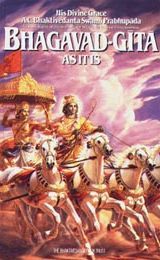


The Complete Works of Srila Prabhupada
All the books, the letters and conversations at your
fingertips


All Srila Prabhupada's books and more on one disk
http://www.vedabase.com




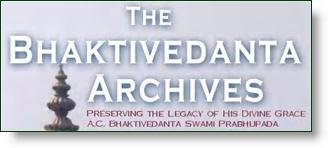
Srila Prabhupada's Audio lectures to listen to on-line:
http://www.hare-krishna.org/srila-prabhupada-lectures.htm
Listen to Srila A.C. Bhaktivedanta Swami Prabhupada on-line
- all 900 of his lectures are available HERE:
http://www.prabhupadavani.org/
Srimad Bhagavatam - the entire lecture series listen and
read along on-line - Narrated by Amala Bhakta dasa:
http://www.prabhupadavani.org/SB_index.html

The new enhanced Prabhupada MP3 series
http://www.prabhupada.com/store/store.php?page=product.php&id=MP3AUDIOLIB








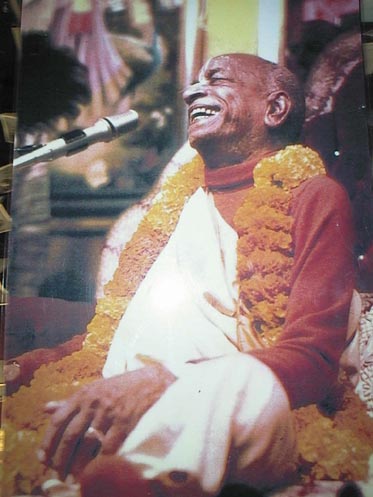
Visit "Prabhupada Connect" for all manner of Prabhupad
Nectar:
http://www.prabhupadaconnect.com/Index.html
Srila Prabhupada's Final Lesson Video - Downloadable and
viewing on-line
http://users.iskconludhiana.com/images/thumbnails.php?album=21


All Srila Prabhupada's original books
available for sale here.

Download all the Hare Krsna teachings which includes
all Vaisnava and
Vedic concepts by visiting one of the sites listed at
the following address.
http://www.geocities.com/suci123/bookdownloadsites1.html
The Bhaktivedanta Book Trust
Srila Prabhupad Memorial Library
http://www.krishna.com/main.php?id=33


33 Books Online Including Srimad Bhagavatam!
http://www.geocities.com/freeprabhupadabooks
The compressed "self extracting" file mentioned is now currently
available for download
http://www.krsnaconsciousness.org/Gauranga/Folio/BhaktivedantaVedabase_DOS.exe

Download or Listen to Prabhupad Bhajans HERE:
http://www.prabhupadavani.org/web/text/Bhajans.html


On-line 1972 McMillan edition - Bhagavad Gita As It Is:
http://www.asitis.com/

Bhagavad Gita AS IT IS on-line through the Tirupathi
Balaji site:
http://www.bhagavad-gita.us/

Bhagavad Gita Study guide on-line book:
http://chantandbehappy.com/gita/studyguide/StudyGuide-main.htm
Bhagavad Gita Study guides by numerous Iskcon devotees
- FREE downloads:
http://www.veda.harekrsna.cz/library/#3

All the Scriptures you'd ever need 4 FREE
http://www.hknet.org.nz/index-books.htm
http://www.hknet.org.nz/DDB.htm
http://www.hknet.org.nz/DDB2.html
last updated 4th August 2003


Srimad Bhagavad Gita AS
IT IS
Bhagavad Gita: Chapter
6 - Dhyana-yoga
TEXTS 20-23
yatroparamate cittam
niruddham yoga-sevaya
yatra caivatmanatmanam
pasyann atmani tusyati
sukham atyantikam yat tad
buddhi-grahyam atindriyam
vetti yatra na caivayam
sthitas calati tattvatah
yam labdhva caparam labham
manyate nadhikam tatah
yasmin sthito na duhkhena
gurunapi vicalyate
tam vidyad duhkha-samyoga-
viyogam yoga-samjnitam
WORD FOR WORD
yatra--in that state of affairs where; uparamate--cease
(because one feels transcendental happiness); cittam--mental activities;
niruddham--being restrained from matter; yoga-sevaya--by performance of
yoga; yatra--in which; ca--also; eva--certainly; atmana--by the pure mind;
atmanam--the self; pasyan--realizing the position of; atmani--in the self;
tusyati--one becomes satisfied; sukham--happiness; atyantikam--supreme;
yat--which; tat--that; buddhi--by intelligence; grahyam--accessible; atindriyam--transcendental;
vetti--one knows; yatra--wherein; na--never; ca--also; eva--certainly;
ayam--he; sthitah--situated; calati--moves; tattvatah--from the truth;
yam--that which; labdhva--by attainment; ca--also; aparam--any other; labham--gain;
manyate--considers; na--never; adhikam--more; tatah--than that; yasmin--in
which; sthitah--being situated; na--never; duhkhena--by miseries; guruna
api--even though very difficult; vicalyate--becomes shaken; tam--that;
vidyat--you must know; duhkha-samyoga--of the miseries of material contact;
viyogam--extermination; yoga-samjnitam--called trance in yoga.
TRANSLATION
In the stage of perfection called trance, or samadhi,
one's mind is completely restrained from material mental activities by
practice of yoga. This perfection is characterized by one's ability to
see the self by the pure mind and to relish and rejoice in the self. In
that joyous state, one is situated in boundless transcendental happiness,
realized through transcendental senses. Established thus, one never departs
from the truth, and upon gaining this he thinks there is no greater gain.
Being situated in such a position, one is never shaken, even in the midst
of greatest difficulty. This indeed is actual freedom from all miseries
arising from material contact.
PURPORT by HDG Srila A.C. Bhaktivedanta Swami Prabhupad:
By practice of yoga one becomes gradually detached from
material concepts. This is the primary characteristic of the yoga principle.
And after this, one becomes situated in trance, or samadhi, which means
that the yogi realizes the Supersoul through transcendental mind and intelligence,
without any of the misgivings of identifying the self with the Superself.
Yoga practice is more or less based on the principles of the Patanjali
system. Some unauthorized commentators try to identify the individual soul
with the Supersoul, and the monists think this to be liberation, but they
do not understand the real purpose of the Patanjali system of yoga. There
is an acceptance of transcendental pleasure in the Patanjali system, but
the monists do not accept this transcendental pleasure, out of fear of
jeopardizing the theory of oneness. The duality of knowledge and knower
is not accepted by the nondualist, but in this verse transcendental pleasure--realized
through transcendental senses--is accepted. And this is corroborated by
Patanjali Muni, the famous exponent of the yoga system. The great sage
declares in his Yoga-sutras (3.34): purusartha-sunyanam gunanam pratiprasavah
kaivalyam svarupa-pratistha va citi-saktir iti.
This citi-sakti, or internal potency, is transcendental.
Purusartha means material religiosity, economic development, sense gratification
and, at the end, the attempt to become one with the Supreme. This "oneness
with the Supreme" is called kaivalyam by the monist. But according to Patanjali,
this kaivalyam is an internal, or transcendental, potency by which the
living entity becomes aware of his constitutional position. In the words
of Lord Caitanya, this state of affairs is called ceto-darpana-marjanam,
or clearance of the impure mirror of the mind. This "clearance" is actually
liberation, or bhava-maha-davagni-nirvapanam. The theory of nirvana--also
preliminary--corresponds with this principle. In the Bhagavatam (2.10.6)
this is called svarupena vyavasthitih. The Bhagavad-gita also confirms
this situation in this verse.
After nirvana, or material cessation, there is the manifestation
of spiritual activities, or devotional service to the Lord, known as Krsna
consciousness. In the words of the Bhagavatam, svarupena vyavasthitih:
this is the "real life of the living entity." Maya, or illusion, is the
condition of spiritual life contaminated by material infection. Liberation
from this material infection does not mean destruction of the original
eternal position of the living entity. Patanjali also accepts this by his
words kaivalyam svarupa-pratistha va citi-saktir iti. This citi-sakti,
or transcendental pleasure, is real life. This is confirmed in the Vedanta-sutra
(1.1.12) as ananda-mayo 'bhyasat. This natural transcendental pleasure
is the ultimate goal of yoga and is easily achieved by execution of devotional
service, or bhakti-yoga. Bhakti-yoga will be vividly described in the Seventh
Chapter of Bhagavad-gita.
In the yoga system, as described in this chapter, there
are two kinds of samadhi, called samprajnata-samadhi and asamprajnata-samadhi.
When one becomes situated in the transcendental position by various philosophical
researches, he is said to have achieved samprajnata-samadhi. In the asamprajnata-samadhi
there is no longer any connection with mundane pleasure, for one is then
transcendental to all sorts of happiness derived from the senses. When
the yogi is once situated in that transcendental position, he is never
shaken from it. Unless the yogi is able to reach this position, he is unsuccessful.
Today's so-called yoga practice, which involves various sense pleasures,
is contradictory. A yogi indulging in sex and intoxication is a mockery.
Even those yogis who are attracted by the siddhis (perfections) in the
process of yoga are not perfectly situated. If yogis are attracted by the
by-products of yoga, then they cannot attain the stage of perfection, as
is stated in this verse. Persons, therefore, indulging in the make-show
practice of gymnastic feats or siddhis should know that the aim of yoga
is lost in that way.
The best practice of yoga in this age is Krsna consciousness,
which is not baffling. A Krsna conscious person is so happy in his occupation
that he does not aspire after any other happiness. There are many impediments,
especially in this age of hypocrisy, to practicing hatha-yoga, dhyana-yoga
and jnana-yoga, but there is no such problem in executing karma-yoga or
bhakti-yoga.
As long as the material body exists, one has to meet the
demands of the body, namely eating, sleeping, defending and mating. But
a person who is in pure bhakti-yoga, or in Krsna consciousness, does not
arouse the senses while meeting the demands of the body.
Rather, he accepts the bare necessities of life, making the best use
of a bad bargain, and enjoys transcendental happiness in Krsna consciousness.
He is callous toward incidental occurrences--such as accidents, disease,
scarcity and even the death of a most dear relative--but he is always alert
to execute his duties in Krsna consciousness, or bhakti-yoga. Accidents
never deviate him from his duty. As stated in the Bhagavad-gita (2.14),
agamapayino 'nityas tams titiksasva bharata. He endures all such incidental
occurrences because he knows that they come and go and do not affect his
duties. In this way he achieves the highest perfection in yoga practice.
His Divine Grace A.C. Bhaktivedanta Swami Prabhupada
Copyright 1983 The Bhaktivedanta Book Trust International. Used with
permission.

Bhagavad Gita As It Is - http://www.asitis.com/
Bhaktivedanta Vedabase - Bhagavad Gita on-line http://bhagavadgitaasitis.com/
Bhaktivedanta VedaBase: Bhagavad-gita As It Is http://vedabase.net/bg/en
Bhagavad Gita Multi Media Web-version http://chantandbehappy.com/gita/
Listen to Bhagavad Gita on line - http://www.Gitamrta.org
View our Bhagavad Gita Overview:
http://www.hknet.org.nz/BG.html
Archive: http://www.cs.rice.edu/~vivek/btg/archive/
Home Page: http://www.cs.rice.edu/~vivek/btg/
Join Bhagavad Gita eGroups HERE
mailto:bhagavad_gita-owner@egroups.com


Prabhupada Uvacha:
(here's some nectar, sometimes it comes in the form of Srutakirti prabhu's
diary, other times from Govinda dasi's diary, Hari Sauri prabhu's Transcendental
Diary, Bhurijan prabhu's book, or sometimes from a letter, or other related
source, but still nectar...)
We have got very simple test in Krsna consciousness
movement
June 4th, 1976
In class Prabhupada strongly persued the same
point. The verse stated that the Visnudutas returned the challenge of the
Yamadutas by asking them that if they were the genuine representatives
of Yamaraja they should describe what is real religion, dharma. Srila Prabhupada
told us the test of a devotee is whether or not he has actual knowledge.
A show will not do. "Krsna described what is the meaning of dharma. Here
the question is, 'If you are servant of Dharmaraja, then explain what is
dharma and adharma. Dharma means religiosity, and adharma means nonreligiosity.
Everything in this world is duality. If there is black, there is white.
If there is good, there is bad. If there is father, there is son. Otherwise,
there is no meaning of father. 'I am father, bachelor daddy.' No. If you
are father, you must have a son. If you are a son, then you must have a
father. If the son says, 'I dropped from the sky,' how it is possible?
These rascals say it, that there is no creator. First of all, prove that
you have no creator. Your father has created. How you can say there is
no creator? Silent. The rascal is silent. You are talking of 'There is
no creator,' but you, yourself, you were created by your father. So these
rascals are talking foolishly and other foolish persons are accepting them.
But we are not so intelligent. Our answer is that you say, 'There is no
creator. How you are created?' It may be we are rascals also, but this
is our simple questions.
"This morning I was asking that why there is Sunday
first and Monday second? Who can answer? Is there anyone in this meeting
who can answer my, this simple question? Why, all over the world, everyone
accepts Sunday, Monday, Tuesday, Wednesday, Somavara, Mangalavara, Guruvara,
the same thing? There may be different language. And Saturday is last.
Why this arrangement? Who can answer? Is there anyone? I've asked this
simple question to so many. Even Svarupa Damodara, our doctor Ph.D., he
has not yet answered. And I've asked this question to Dr. Wolf also. He's
not present here?"
One of the devotees attempted to answer. "Because
Sunday is God's day. Sunday is Krsna's day."
"That is your sentiment. Speak scientifically.
Nowadays, the scientific days, you have to speak scientifically," Prabhupada
said, still looking for the answer.
"The order of the planets," another devotee called
out.
"Yes, that is the answer. Anyway, he has got the
right to ask that 'You are representing Dharmaraja. First of all, explain
what is dharma. Then we shall understand that you are the representative,
or the order-carrier, or the servant of Dharmaraja."
He went on to elaborate this principle of duality,
and then really moved into high gear in his criticism of the scientists.
"We have got two tests. One test is sufficient. If one is not devotee,
if one is not Krsna conscious, he's a demon, bas, finished our conclusion.
We simply ask whether you are Krsna conscious, whether you know Krsna.
I think our Syamasundara's daughter, she used to preach. She used to go
to any elderly person when she was four years old. 'Do you know Krsna?'
she said. So he says, 'No, I don't know.' 'Oh, the Supreme Personality
of Godhead.' This is preaching. Finish, preaching. A child can preach.
A child can understand. 'Do you know God?' 'No.' 'You are a demon!'"
Prabhupada said the word "demon" with such aplomb
everyone burst out laughing. And he keep them going with a parody of a
devotee approaching a scientist. "Finished. Where is the difficulty? As
soon as you say, 'I do not know God,' you are a demon. Bas! First-class
demon. 'I am scientist.' 'You are rascal.' 'No, I have studied, I have
got my degrees.' 'Mayayapahrta-jnana! Rascal, you have studied so long,
simply waste of time. Your real knowledge is taken away. Because you do
not know God.' That is described. We have got very simple test in Krsna
consciousness movement how to distinguish between an intelligent man a
rascal. As soon as we understand that he's not Krsna conscious, he's a
rascal. Bas. There is no need of testing. Even though he's M.A., Ph.D.
D.H.C. and so on, so on, still we shall call him a rascal. This is open
challenge; it is not secret."
He added weight to this seemingly radical conviction
with a quote from the great brahmana Canakya Pandita. "He very nicely says
that rascals and fools -- must give up their company. Tyaja durjana-samsargam.
'No, I have got many friends, they are university educated.' But he says,
vidyayalankrto 'pi san. Even they are with degrees of M.A., Ph.D., even
he is educated, so-called educated, he's not educated. Anyone who does
not know God, he's not educated, he's a rascal. This is our conclusion.
Not our conclusions, this is sastra's conclusion. So 'he has got so many
degrees and he's rascal and he's durjana, a bad man?' 'Yes.' 'Why?' Now
manina bhusitah sarpah kim asau na bhayankarah. Suppose a serpent, he has
got a gem on his head. Is it not fearful? Very good example. Suppose a
snake comes here and he, it has a jewel on the head, so you'll be all safe?
No. He's dangerous. So that is going on. So-called educated scientist,
degrees, what they're doing? Atom bomb, kill men. This is their scientific
discovery. That you can kill a man with a knife, one man or two men. Now
we have got scientific discovery, millions of men in a moment, come on,
discovery. So 'Why don't you discover something that millions of hospitals,
diseased men can be brought into life again?' 'That we cannot do.' Kill,
killing, killing is going on. What you have discovered? So this is their
scientific... Discover something and declare that 'There is no more death.
Here is medicine.' Then that is scientific discovery. What is this nonsense?
People are dying, and you have discovered something to facilitate death?
Is that discovery? Therefore they are this snake with jewel. That's all.
They're not gentlemen even. A gentlemen thinks that 'I shall kill so many
persons by dropping one atom bomb. I have discovered such nonsense thing?'
And they are going on as scientist. So be careful. They are like snakes
with jewel on the head. That's all."
- From the "A Transcendental Diary Vol 2" by HG
Hari Sauri dasa
To receive little snippets of nectar like this on a daily basis subscribe
HERE: or If you want to introduce anyone else in reading Srila Prabhupada
Nectars, please send their eMail addresses to mailto:krpamaya_gauranga@hotmail.com
Please Chant:
 Hare
Krishna Hare Krishna Krishna Krishna Hare Hare
Hare
Krishna Hare Krishna Krishna Krishna Hare Hare
 Hare
Rama Hare Rama Rama Rama Hare Hare
Hare
Rama Hare Rama Rama Rama Hare Hare
...................and be Happy

Listen to Srila Prabhupad on-line
....a different lecture, morning walk, conversation or
class daily.
"God Is Open To Everyone"
66/12/08 New York, Bhagavad-gita 9.22-23
Listen to the entire lecture on-line:
http://prabhupadaradio.com/M3U/Gita/m3u/GT269.m3u
Prabhupada:
ananyas cintayanto mam
ye janah paryupasate
tesam nityabhiyuktanam
yoga-ksemam vahamy aham
[Bg. 9.22]
Now Lord Krsna is speaking about His own devotees. So
far He has spoken about the elevationists, materialist elevationists. Evam
trayi-dharmam anuprapanna gatagatam kama-kama labhante. Repeating, repeating
the same process, sometimes going up, sometimes coming down -- this is
the material process. Today I am the richest man, and tomorrow I may be
a poverty-stricken man in the street. This is going on. As we find in this
earth, so also by our pious activities we can be promoted in better planets.
Then ksine punye martya-lokam visanti [Bg. 9.21]. And when the resultant
actions of pious activities is finished, then again we are driven to this
earth or down than this earth. So this is going on. Lord Caitanya said
that ei rupe brahmanda bhramite kona bhagyavan jiva [Cc. Madhya 19.151],
that "This way, this cycle of different species of life, they are going
on. So traveling in this way, somebody who is very fortunate, by association
of devotees, he gets the seed of devotional service." Ei rupe brahmanda
bhramite kona bhagyavan jiva [Cc. Madhya 19.151]. To achieve the seed of
devotional service is a fortunate achievement. It is not very easy because
it ceases the cycle of different transmigration of the soul. By ignorance
we take this spot life as permanent settlement and we think that "We shall
live here permanently and make arrangement to live here permanently and
make assets for my children, for my nation." But we do not know that the
cycle of transmigration is not fixed up.
I do not know what next life is mine. I do not know where
is the..., who is coming as my son, who is coming, who is going out of
the scene as my son. These laws we do not know. But we are chewing the
chewed. Evam gatagatam kama-kama labhante. Under the spell of this illusory
energy, we are captivated by this temporary sense gratification and we
have forgotten our real life. So those who are in the sense of his real
constitutional, of their real constitutional position, as Bhagavad-gita
started from the very beginning... This very conception, that "I am this
body," beginning from, from beginning of the Bhagavad-gita this is discredited,
that "You are not this body." So you have to mold your life in your identification
of spiritual existence. So so far the materialist is concerned, they are
chewing the chewed. Punah punas carvita-carvananam [SB 7.5.30]. The example,
which I gave you the last day, that as sugar cane, one has extracted all
the juice by chewing, and it is again thrown into the, on the earth and
somebody is chewing, so there is no juice. So we are simply repeating the
same thing. We do not question whether this process of life can at all
give us happiness. But we are trying and trying, trying the same thing.
The ultimate purpose of sense gratification and the highest,
topmost sense gratification is sex life. So we are trying, chewing, eschewing,
you see, extracting. But that is not the process of happiness. The happiness
is different. Sukham atyantikam yat tad atindriya-grahyam. Real happiness
is transcendental. And that transcendental means that I must understand
what is my position and what is my process of life. In this way this Krsna
consciousness will teach you. So those who are Krsna conscious, about them
the Lord is saying, ananyas cintayanto mam. Ananyas cintayantah means always,
twenty-four hours, without any deviation, always thinking of Krsna. Naturally,
if you are engaged in the business of Krsna, then you will always think
of Krsna. Anyone who is absorbed in certain particular business, he's always
thinking of that thing. So anyone who is engaged in Krsna consciousness,
his business is to think of Krsna always. Just like you are reading, hearing
on this Bhagavad-gita. It is spoken by Krsna. And if you think at home
that "This sort of speeches was given by Lord Krsna. This is the essence,"
so that is Krsna cintayantah. To think of Bhagavad-gita is also Krsna thinking
because Bhagavad-gita is not different from Krsna, absolute. It is from
the absolute one. There is no duality.
In the absolute sense there is no duality. If I speak
something, because I am not speaking in the absolute, therefore my speaking
and my self, different. But here I am speaking the words of Lord Krsna.
Therefore the words of Lord Krsna is not different from Krsna. So if we
think of Bhagavad-gita, the instructions which we receive from Bhagavad-gita,
that is also thinking of Krsna. So ananyas cintayanto mam: "Always who
are thinking about Me..." Ye janah paryupasate. And why one should think
of Krsna unless he has fully surrendered to Krsna? Unless one has taken
the business of Krsna, he cannot think of Krsna. He cannot think of Krsna.
Therefore it is said that ananyas cintayanto mam ye janah paryupasate.
Paryupasate means constantly worshiping in that way. Tesam nityabhiyuktanam.
Abhiyukta: he is always engaged in Krsna consciousness. Therefore, yoga-ksemam
vahamy aham [Bg. 9.22]. Not that only the materialistic people will remain
happy. Krsna assures that one who is always engaged in Krsna consciousness,
his happiness will be not divorced. "He will be also happy because I will
make him, I will supply him whatever he requires."
continued.......................
Listen to the entire lecture on-line:
http://prabhupadaradio.com/M3U/Gita/m3u/GT269.m3u
or receive in mailbox and Subscribe HERE:
mailto:lectures-subscribe@prabhupadavani.org
Sravanam kirtanam at:
http://www.PrabhupadaVani.org
© 2001 The Bhaktivedanta Book Trust International. Used with permission.

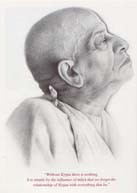
SRILA PRABHUPADA'S QUOTE OF THE DAY
" In the meantime try to recoup your health,
depending on Krishna, because after all, He is the ultimate Master of all
situations. It is not the doctor, or the medicine, or the place, but it
is ultimately Krishna Who is the Master to do every thing. With this viewpoint
we shall go forward."
Prabhupada Letter to Rayarama : Thursday
March 20 : 1969
Sign-up to receive these quote HERE:
mailto:haribol@pacific.net.sg

Bhaktivedanta Vedabase Network ...
http://vedabase.net/


The Scientific - Mathematical
Proof for God's existence:
http://geocities.com/sector114

http://robot-hosting.com/php/login_nicholas.html
user name = guest
password = guest
(Collection of philosophical and mathematical proofs
for existence of God can be found in this site.)

Scientifically Philosophical Books for the layman
 ...
... ...
...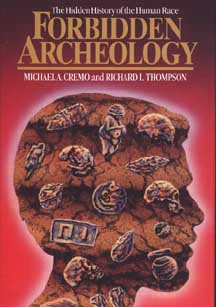 ...
...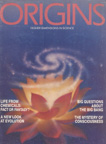
Click on any of these books to read more about them and where to get
a copy
or contact your local temple for purchases
sample of Life
comes from Life HERE.pdf

Lotus Imprints - Preserving Prabhupada's Legacy - The
Publishing House of Hari Sauri dasa
http://www.lotusimprints.com/

Quotes from Shastra - scriptures
View using Balaram font
asato ma sadgamaya,
Tamaso ma jyotirgamaya,
Mrityor ma amritam gamaya.
Lead us from the unreal to the real, from darkness to light, from death
to immortality.
-Brihadaranyaka Upanishad 1.3.28
Courtesy of http://www.vedabase.com/
used
with permission

Sri Hari-bhakti-kalpa-latika
The Flowering Vine of Devotion to Lord Hari
Table of Contents
First Cluster of Flowers 2
Second Cluster of Flowers 7
Third Cluster of Flowers 13
Fourth Cluster of Flowers 15
Fifth Cluster of Flowers 17
Sixth Cluster of Flowers 19
Seventh Cluster of Flowers 23
Eighth Cluster of Flowers 26
Ninth Cluster of Flowers 29
Tenth Cluster of Flowers 30
Eleventh Cluster of Flowers 32
Twelfth Cluster of Flowers 33
Thirteenth Cluster of Flowers 34
Fourteenth Cluster of Flowers 36
Preface
Srila Bhaktivinoda Thakura found the unsigned manuscript of Sri
Hari-bhakti-kalpa-latika, was impressed by it, and printed it in his magazine
Sajjana-tosani. His son, Srila Bhaktisiddhanta Sarasvati, printed
it as a book and kept it in print, reprinting it again and again.
- Kusakratha dasa
First Cluster of Flowers
1 Blinded by His illusory potency, (maya), the entire world cannot understand
that Lord Krsna is the all-pervading Supersoul, the father and controller
of all the worlds, the eternal resting-place of the entire universe, and
as sweet as nectar. When the learned devotees understand Hum, they
become conscious of supreme spiritual bliss. He is the dear friend
of the devotees and the giver of shelter. I offer my respectful obeisances
to Him, Lord Krsna, the enemy of the Mura demon.
2 Perhaps it is because, although He is independently full of supreme
transcendental bliss, He is nevertheless also full of love for the Vraja-gopis,
or perhaps it is in order to show mercy to the devotees, on the pretext
of killing the demons, that Lord Krsna, desiring to enjoy pastimes, has
descended to the land of Vrajabhumi in this world. I offer my respectful
obeisances to that Lord Krsna, the all-blissful Supreme Personality of
Godhead, whose complexion is like the colour of a multitude of dark monsoon-clouds.
3 Lord Krsna's devotional service transforms this illusory material
world into the real spiritual world. Let us worship that blissful
Lord Krsna, Who delights the hearts of the gopis.
4 The celebrated desire-vine of Lord Hari's pure devotional service
grows form the ocean of pious deeds, and it destroys all ignorance.
It's excellent roots are the association of devotees, and it's new sprouts
are faith in Lord Hari. It's budding flowers are renunciation of
the world, and it's splendid fully blossomed flowers are pure love of God.
Supreme transcendental knowledge is that vine's fruit, which is full of
the nectarean sweetness of intense spiritual bliss. May that celebrated
vine delight the saintly devotees.
5 What is the comparison between me, a slow witted fool who has never
properly studied the Vedic scriptures, and the devotion which the pure-hearted
souls, expert at understanding spiritual truths, bear for Lord Krsna, the
controller of the universe. Although I am unworthy to describe this
pure devotional service, because I wish to understand it, and because I
also wish to cleanse my heart, I am recklessly writing this poem.
I beg the great pure devotees please to forgive me.
6 Describing the glories of the transcendentally blissful Lord Vasudeva,
who is supremely worshipable because of His eternal existence, truthfulness,
purity, supreme mercy, and because He is the origin of everything, the
author says: O Lord, although Lord Brahma, Lord Siva and other great devotees
enjoy pastimes in the ocean of transcendental bliss and knowledge which
is Yourself, they remain unable to actually understand Your glories.
Nevertheless, I, who am unintelligent, ineloquent, and unable to perceive
the fragrance of even a tiny drop of the honey of Your lotus feet, am trying
to describe Your glories. Am I not very reckless and foolhardy in
this attempt?
7 From the pores of the Supreme Lord's transcendental body, unlimited
millions of universes, replete with fourteen divisions of planetary systems,
continually emanate. That Supreme Person is full of intense transcendental
bliss, without change, unlimited, eternally manifest, untouched by the
three modes of material nature, and unapproachable even by the Vedas.
Within this material world, who has even been able to understand Him?
8 Lord Siva, Lord Brahma, Surya and other demigods who control universal
affairs and grant benedictions are all the potencies of that Supreme Person,
who is nevertheless Nanda Maharaja's smiling lotus-faced son. May
that Supreme Lord, who independently enjoys pastimes with the gopis in
the forest of Vrndavana, grant to me transcendental bliss.
9 That Supreme Person is glorified throughout the Vedas and Upanisads,
and the creation, maintenance and destruction of the material universes
are only a small fraction of His unlimited pastimes. All glories
to that Supreme Lord, who is an ocean of perfect transcendental bliss,
and who, within the forest of Vrndavana, is the Lord and hero of the gopis.
10 That Supreme Person is the origin even of the demigods, the abode
of unlimited auspicious pastimes, the ocean of all perfections, the only
residence of happiness, the controller of all mystic powers, the treasury
of all opulences, and the highest in all the three worlds. I worship
that Supreme Lord, Who is dearly loved by the devotees.
11 That Supreme Lord is the controller of the three worlds, beyond
the three modes of material nature, knowable by the Vedanta, and the ultimate
fruit of Vedic study. That Lord is indirectly manifest as the imperishable
Brahman effulgence, meditated upon by Brahma, Siva and others, and He is
directly manifest in Vrndavana, where He enjoys pastimes in the company
of the gopis.
12 That transcendentally pure and bliss Supreme Lord, whom the saintly
persons see within their hearts, whom the Vedantists designate as the undifferentiated
Brahman, and whose unlimited glories are unknowable by Lord Brahma, Lord
Siva, and others, jubilantly enjoys pastimes in His original human-like
form in the land of Vrajabhumi.
13 That perfect and complete Supreme Person, who has no equal, and
whose form is eternal, full of knowledge and bliss, enjoys pastimes according
to His own desire.
14 Born from the weight of the touch of the Supreme Lord's lotus feet,
and carried on Lord Siva's head, the Ganges River has purified the three
worlds. How is it possible to describe the glories of that Supreme
Lord?
15 O gentle reader, you may think: "Lord Siva, Narada Muni, and many
others are the personal servants of the Supreme Lord. What am I but
a small misbehaved child in their midst?" O gentle reader, do not
become discouraged. Do not give up Lord Mukunda's devotional service
as something you cannot do. Although the Supreme Lord is the controller
of everything, and although He is very difficult to approach, He is like
an ocean of mercy and He is the dear friend of the devotees. He becomes
controlled by devotion and shows mercy to His devotee, even if the devotee
was born in a family of outcastes.
16 That Supreme Person, who is greater than the greatest, and after
whom the yogis search, cannot be attained by studying the Vedas and Agamas,
or by performing yoga, austerities, or fruitive activities. He is
attained only by devotional service.
17 Although Dhruva Maharaja had never studied the Vedas and Agamas,
and although he had never performed materially pious actions, he attained
the supreme destination simply by performing devotional service to the
Lord.
18 A father who sees his son eat clay, snatches it away and gives him
a candy instead. In the same way, the Lord, who is very affectionate
to His devotees, removes the material desires from those who, unaware of
their actual spiritual nature, worship Him with material motives.
The Lord gives them His intensely delightful lotus feet.
19 If even misbehaved persons, intent on their own happiness, attain
Lord Hari's lotus feet by occasionally worshipping Him, who can describe
the good fortune of the saintly devotees, who worship the Lord in pure
love?
20 Even if served by those with personal motives, in a troublesome
and annoying way, or with hypocrisy, the Lord liberates His devotees.
Who is more merciful than He?
21 If a person who has never attained any materially pious activities,
worships Lord Hari's lotus feet by offering some water and tulasi leaves,
the Lord, Who is the friend of the devotees, and unapproachable by the
materially pious, gives in return His own lotus feet.
22 The Lord becomes controlled by His devotees, although He does not
show His mercy to the non-devotees, even if they are very pious, great
yogis, or very rich and opulent. Why does the whole world not worship
such a merciful Lord?
23 One who gives up all materially pious duties and with undeviating
concentration continually worships the lotus feet of Lord Hari, will easily
and happily climb to the Lord's transcendental abode, stepping on the heads
of the materially pious non-devotees.
24-5 Brightly blazing with the oil of love, the lamp of devotional
service to the Lord completely destroys the darkness of past karma.
Lord Hari is like an ocean of mercy for the distressed conditioned souls,
or like an ocean of the nectar of transcendental bliss. Except for
Him, who is able to rescue those burning in the forest fire of material
existence?
26 Sober and discriminating persons who aspire to serve the lotus feet
of Lord Hari easily conquer the unconquerable, inimical material senses.
They who try to subdue the senses by practicing astanga yoga or following
varnasrama-dharma, remain unsuccessful and do not become happy.
27 They who travel on the path of devotional service to the lotus feet
of Lord Hari should abandon all activities prescribed by the varnasrama
system for material improvement and sense-gratification. Day by day
they should cultivate renunciation, until the Lord is personally manifest
before them.
28 Somehow or other the author has not yet been able to describe the
glories of the persons intent on chanting the glories of Lord Krsna.
In this regard he says: One who has taken shelter of Lord Hari's devotional
service is an actual hero, an actual knower of the Vedas, and is actually
fortunate and pious. Laksmi-devi, the goddess of fortune personally
searches him out. He is the best of all.
29 Perception of spiritual truth takes shelter of him, the three-fold
material miseries do not torment him, and the goals of human life (religion,
sense gratification, economic-development, and liberation) beg to serve
he who always finds pleasure in the Lord's devotional service.
30 He who respectfully takes shelter of Lord Acyuta's devotional service
purifies the universe, makes the earth prosperous and auspicious, and easily
crosses the ocean of repeated birth and death.
31 Lust and other enemies do not trouble him, the demigods and demons
bow before him, and even liberation yearns to meet he who finds pleasure
in the sweetness of service to Lord Hari.
32 All fears fear him. From him religion is born. From
him all darkness flees. He shines with the sweetness of devotional
service.
33 His touch kills sin. His strength cuts repeated birth and
death. His glory purifies the world. He is filled with devotion
to the Lord.
34 In a heart where the Lord's devotional service shines, the Ganges,
Yamuna and other sacred rivers flow, all holy places of pilgrimage live,
and all principles of religion play.
35 One devoted to Lord Madhusudana delights the demigods. Transcendental
virtues always dwell within him and spiritual knowledge always shines in
his heart.
36 If this is the eternal glory of Lord Krsna's mercy to the devotees,
then why do not all people worship Him? The author replies: By day
eager only to fill their bellies, at night absorbed only in sleeping or
sex, their hearts tossed by limitless insatiable desires and their intelligence
bewildered by illusions, how will the worshippers of the material world
worship Lord Krsna, who cannot be approached by even the kings of the sages?
37 For they whose hearts are filled with greed, who serve the many
demigods, whose every moment is engaged in material activities, pious deeds,
austerities, and mantras, who practice yoga to attain mystic powers, and
whose intelligence is bewildered by illusion, pure devotional service is
very far away.
38 Not playing in the nectar ocean of bliss that is the handsome fresh
monsoon cloud of eternal Lord Krsna, whose glories have no limit, and who
stands not far away, the bewildered man searching for happiness runs deep
into the mirage of repeated birth and death which becomes only suffering
for him.
39 The body is the real home. Saintliness is the real beautiful
wife. Voluntary devotional service to Lord Hari is the real wealth.
Satisfaction is the only friend. These bring eternal happiness.
Still, a person yearning for false happiness foolishly will leave this
home.
40 How can those drowning in the impassable ocean of repeated birth
and death, which is filled with thousands of snakes of false-hope, fearful
seaweed jungles of false-ego and possessiveness, sharks and crocodiles
of lust, anger, and other vices, great waves of suffering and waters of
deep illusion, attain pure devotion for Lord Govinda?
41 If this is so, how can there ever be devotional service? The
author says: In the beginning is respect for saintly persons, and from
that the mind becomes pure. Then one associates with devotees and
by their mercy develops faith in the Lord's words. Then one develops
devotional service, and then renunciation. From renunciation, spiritual
awareness, which is full of great and intense bliss, is manifest.
42 The vine of devotional service grows in an auspicious, pious heart.
Planted as a seed by the association of devotees, and daily sprinkled by
the waters of faith, it grows. When renunciation appears, the vine
expands and climbs the trunk and branches of the tree of awareness of the
Supreme Personality of Godhead. Then the vine blossoms with flowers
of pure love of God and fruits filled with the nectar of intense spiritual
bliss.
43 Although devotional service to Lord Krsna, the master of Gokula,
cannot exist unless lust and other vices are conquered, these great enemies
are not conquered without the weapon of devotional service. For this
reason intelligent persons accept the path of association with devotees
and daily serve the Lord. In this way they become able to defeat
lust and his associates.
44 The ocean of material existence is filled with the waters of great
suffering and crowded with the crocodiles of lust and other vices.
Although drowning in that ocean, if one takes shelter on the boat of Lord
Hari's lotus feet, he will easily cross over that ocean which was impassable
for others.
45 They who become intoxicated by drinking the honey of Lord Krsna's
lotus feet do not remember the objects of the material senses, the Vedic
prescriptions for material advancement (karma-kanda), the four goals of
human pursuit (religion, sense-gratification, economic development and
liberation), their children, wife, home or even their own material bodies.
46 Save for the pure, painless, dispassionate, transcendental path
of service to Your lotus feet, I have no other path. I will not try
for splendid Svargaloka, which will be cut by Your wheel of time.
I will not try for the fearful liberation that jumps over Your feet.
47 Devotional service to Lord Hari is the best fruit of the desire
tree, the splendid jewel from the ocean of three Vedas, the root of the
tree of transcendental knowledge, the swiftly moving current of the ocean
of spiritual bliss, the bridge crossing the ocean of birth and death, and
the staircase climbing to nectar. Who in this world will not desire
the rare treasure of devotion to Lord Hari?
Second Cluster of Flowers
coming next

All pictures from Srimad Bhagavatam and Iskcon works - Copyright ©2005
The Bhaktivedanta Book Trust
International, on the web at .http://www.krishna.com/.
Used with permission.









![]()
![]()
![]()

![]()
![]()
![]()
![]()

![]()
![]()
![]()
![]()















